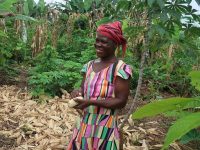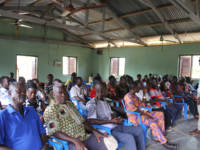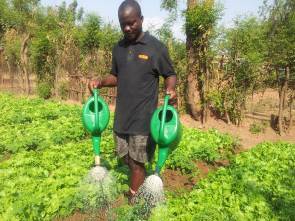 Climate experts have predicted a huge negative impact of of climate change on the country’s agriculture and food security. They do not expert a good rainfall pattern this year.
Climate experts have predicted a huge negative impact of of climate change on the country’s agriculture and food security. They do not expert a good rainfall pattern this year.
The prediction has necessitated a shift in Agricultural practices as conventionally practiced in Ghana.
It is against this backdrop that farmers have been urged to embrace tilling as the new method of farming. Tillage as a method of farming has not been commonly used by farmers; however, experts believe it is the way to go.
Tillage practices
Tillage has been used for millennia to prepare the soil prior to sowing many of the annual grain crops. It involves applying power to break up and rearrange the entire topsoil structure.
It destroy weeds and pests and is also important for incorporating, redistributing or releasing nutrients and making the soil texture suitable for seed sowing, seed germination and for easy penetration of seedling roots.
The Director of Center For No – Till Agriculture, at Amanchia in the Atwima Nwabiagya district of the Ashanti region, Dr. Kofi Boah, has called on farmers to adopt tillage practices during the main crop season to salvage the country from the scare of food insecurity.
He said tillage practices are important in areas where water is a major limitation to production and where soil structure is poor and erosion is also a problem.
“These practices when implemented and followed by the farmers will have long term protection of the soil resources in its natural and rich state, reduce the cost of repairing machinery and labour in clearing of the weeds from the farms before planting or sowing of seeds.”
Dr. Kofi Boah made these remarks during a visit by some members of Ghana Agricultural & Rural Development Journalists Association (Gardja) to the Center.
The trip afforded journalists the opportunity to be schooled on how the tillage system of farming has helped to boost food efficiency and production for indigenous farmers in the catchment areas of the Center.
This unique farming practice was introduced in Ghana by the Director of the Center for No-Till Agricultural Center
A visit to a 20 acre plantain farm tells how the system seeks to change food production in the coming years despite the looming drought.
He advised farmers to end the trashing and burning of weeds before sowing else they stand losing more during the post-harvest period.
“The climate change pattern is not conducive for farming and to sustain and have enough moisture in the soil proka, in Akan language, is the best farming method to resist the drought in 2016,” he stated.






Whoopee what a great idea, and it is about time in Ghana. Now the next thing should be to get rid of the fertilizers and the weedkillers which are bad for the soil and human and animal health. In other words get back to good old fashioned organic farming the way your ancestors did it.
It shouldn’t stop there. The banks need to start lending money at much cheaper interest rates, and farmers need to stop fraudulently stealing the money provided by investors. I tried to help a farmer and he stole the money and the majority of the crops.
As well, the police need to take action against farming and other fraud so as to encourage foreign investment in farming.
And lastly, the chief’s need to support foreign investment and start opening up land for cultivation, which really as I understand it should be held in trust for the good of the people rather than being sold off to buy new vehicles etc for the royal families. When I went to chief’s for help against a fraudulent farmer they seemed more interested in getting money of me and supporting the farmer. But then, I am white, and I am constantly a target for thieves and con men here in Ghana.